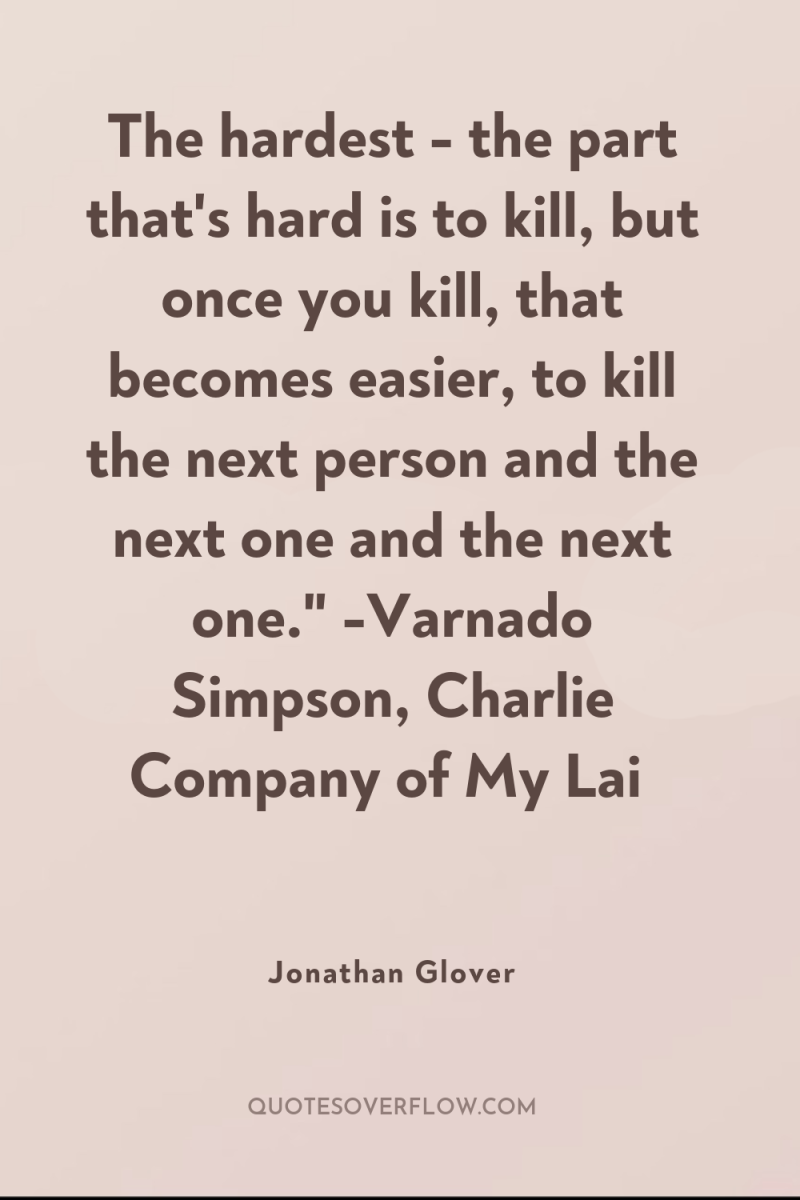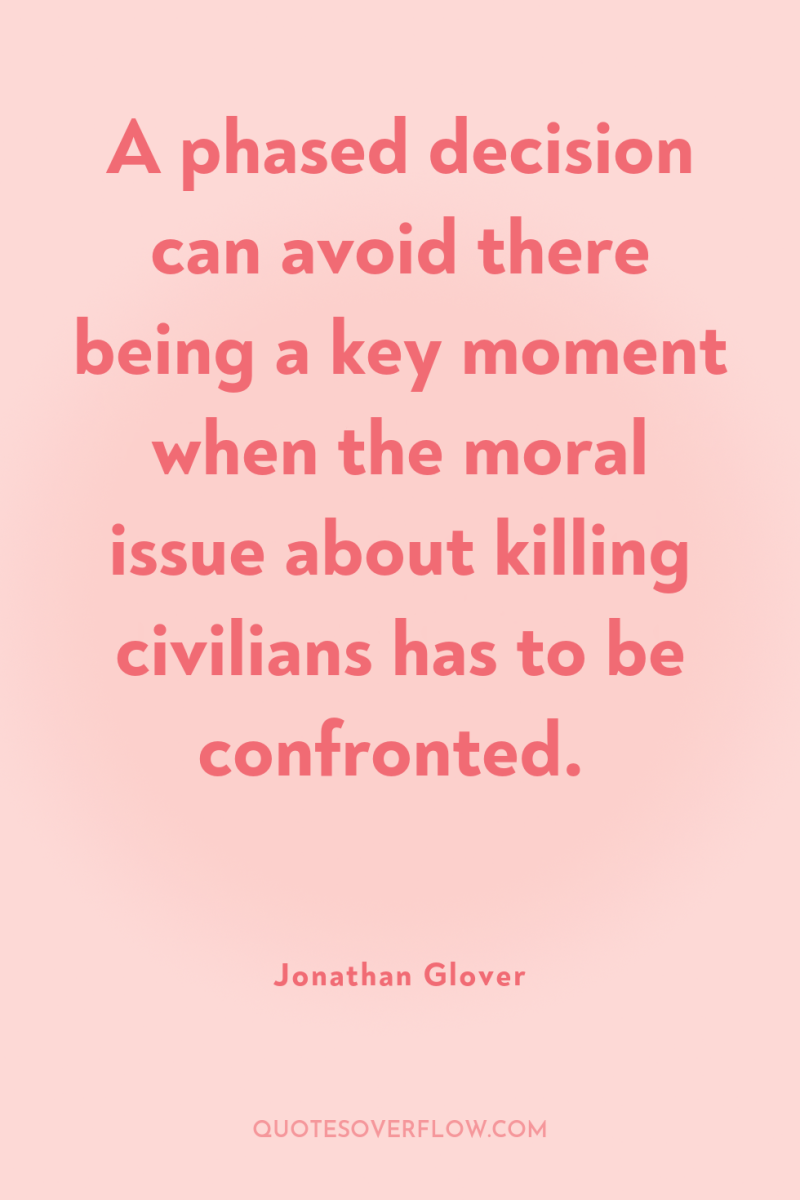1
Stalin’s Russia was a trap, in which even those running the system were caught. The leaders were trapped by fear of Stalin and even he was trapped by his fear of their desire to be rid of him. Everything he had to eat or drink had to be tasted by one of his colleagues first. Beria’s behavior at his death showed that his fear was only partly paranoia.Jonathan Glover
2
Sir Edward Grey echoed this: More than one true thing may be said about the causes of the war, but the statement that comprises most truth is that militarism and the armaments inseparable from it made war inevitable. Armaments were intended to produce a sense of security in each nation — that was the justification put forward in defence of them. What they really did was to produce fear in everybody.Jonathan Glover

3
The hardest - the part that's hard is to kill, but once you kill, that becomes easier, to kill the next person and the next one and the next one." -Varnado Simpson, Charlie Company of My LaiJonathan Glover
4
Those who actually dropped the bombs were less responsible than the people who took the decisions higher up the chain of command. In modern technological war, psychological responses are poorly correlated with degrees of responsibility. In people further back up the chain, this casual distance reduces the psychological resistance they have to overcome.Jonathan Glover

5
A phased decision can avoid there being a key moment when the moral issue about killing civilians has to be confronted.Jonathan Glover

6
The first step away from being manipulated, and towards a more autonomous outlook, is to stand back from a set of responses and think.Jonathan Glover
7
The darker side of Nietzsche’s ideas was incorporated into the Nazi belief system. Part of the link was straightforward: some things Nietzsche said were pure Nazi doctrine. His comments that ‘The extinction of many types of people is just as desirable as any form of reproduction’ and that ‘the tendency must be towards the rendering extinct of the wretched, the deformed, the degenerate’ could come from any work on racial hygiene. Nietzsche’s central contribution was not these explicitly Social Darwinist views, but his rejection of the Judeo-Christian morality of compassion for the weak. Self-creation required hardness towards oneself: a strong will imposing coherence on conflicting impulses. It also requires hardness on others. Conflicts between the self-creative projects of different people made inevitable the attempt to dominate others. The whole of life was a struggle in which victory went to the brave and to the strong-willed. Noble human qualities, linked with the will to power, were brought out in combat but atrophied in peace. Compassion was weakness, cowardice and self-deception. The Judeo-Christian emphasis on it was poison. In drawing these consequences from his beliefs about the death of God and from Social Darwinism, Nietzsche provided the part of the Nazi belief system which ‘justified’ the cruel steps they took to implement their other beliefs.Jonathan Glover
8
In 1969 the Khmer Rouge numbered only about 4, 000. By 1975 their numbers were enough to defeat the government forces. Their victory was greatly helped by the American attack on Cambodia, which was carried out as an extension of the Vietnam War. In 1970 a military coup led by Lon Nol, possibly with American support, overthrew the government of Prince Sihanouk, and American and South Vietnamese troops entered Cambodia.One estimate is that 600, 000 people, nearly 10 per cent of the Cambodian population, were killed in this extension of the war. Another estimate puts the deaths from the American bombing at 1000, 000 peasants. From 1972 to 1973, the quantity of bombs dropped on Cambodia was well over three times that dropped on Japan in the Second World War.The decision to bomb was taken by Richard Nixon and Henry Kissinger and was originally justified on the grounds that North Vietnamese bases had been set up in Cambodia. The intention (according to a later defence by Kissinger’s aide, Peter W. Rodman) was to target only places with few Cambodians: ‘From the Joint Chiefs’ memorandum of April 9, 1969, the White House selected as targets only six base areas minimally populated by civilians. The target areas were given the codenames BREAKFAST, LUNCH, DINNER, SUPPER, SNACK, and DESSERT; the overall programme was given the name MENU.’ Rodman makes the point that SUPPER, for instance, had troop concentrations, anti-aircraft, artillery, rocket and mortar positions, together with other military targets. Even if relatively few Cambodians were killed by the unpleasantly names items on the MENU, each of them was a person leading a life in a country not at war with the United States. And, as the bombing continued, these relative restraints were loosened. To these political decisions, physical and psychological distance made their familiar contribution. Roger Morris, a member of Kissinger’s staff, later described the deadened human responses: Though they spoke of terrible human suffering reality was sealed off by their trite, lifeless vernacular: 'capabilities', 'objectives', 'our chips', 'giveaway'. It was a matter, too, of culture and style. They spoke with the cool, deliberate detachment of men who believe the banishment of feeling renders them wise and, more important, credible to other men… They neither understood the foreign policy they were dealing with, nor were deeply moved by the bloodshed and suffering they administered to their stereo-types. On the ground the stereotypes were replaced by people. In the villages hit by bombs and napalm, peasants were wounded or killed, often being burnt to death. Those who left alive took refuge in the forests. One Western ob-server commented, ‘it is difficult to imagine the intensity of their hatred to-wards those who are destroying their villages and property’. A raid killed twenty people in the village of Chalong. Afterwards seventy people from Chalong joined the Khmer Rouge.Prince Sihanouk said that Richard Nixon and Henry Kissinger created the Khmer Rouge by expanding the war into Cambodia.Jonathan Glover
9
Jung Chang said that Mao ruled by getting people to hate each other: ‘Mao had managed to turn the people into the ultimate weapon of dictatorship. That was why under him there was no real equivalent of the KGB in China. There was no need. In bringing out and nourishing the worst in people, Mao had created a moral wasteland and a land of hatred.Jonathan Glover
10
Part of the Maoist project was the deliberate construction of a new moral identity. To do this it was necessary to destroy people’s previous sense of who they were and to make sure there was no room for it grow back.Jonathan Glover
11
In recent philosophy there has been a growing awareness of the gap between the abstract principles proposed by philosophers and the ways in which people actually think. The kind of rationality admired in the theory of knowledge is idealization. In the real world people have to act on beliefs often based on fragmentary and unreliable evidence.Jonathan Glover
12
Atrocities are easier to commit if respect for the victim can be neutralized. For this reason, humiliation handed out by those with power can be ominous. The link between humiliation and atrocity is often found.Jonathan Glover
13
Solzhenitsyn described this: It would be hard to identify the exact source of that inner intuition, not founded on rational argument, which prompted our refusal to enter the NKVD schools… People can shout at you from all sides: ‘You must! ’ And your own head can be saying also: ‘You must! ’ But inside your breast there is a sense of revulsion, repudiation. I don’t want to. It makes me feel sick. Do what you want without me; I want no part of it. .Jonathan Glover
14
The reality is that in many countries torture of the most revolting cruelty happens routinely, often under the auspices of governments with good relations with Europe and the United States, sometimes using equipment knowingly supplied by Western companies. There is little reason to think torture is in retreat. The festival of cruelty is in full swing.Jonathan Glover
15
In its report issued that year, 1991, Amnesty International recorded protests against human rights abuses in over fifty countries, the protest to thirteen countries making specific reference to torture. These are the kinds of thing many of us have a vague background awareness of, without there being much publicity unless the perpetrators are some currently loathed regime, or unless some highly visible Westerner is among the victims.Jonathan Glover
16
A woman who was a schoolgirl at Hiroshima asked, “Those scientists who invented the atomic bomb, what did they think would happen if they dropped it?Jonathan Glover
17
Above all, the sense of personal responsibility was reduced by the way agency was fragmented. Among the airmen who obeyed the order to drop the bomb, the many scientists who helped to make it, the President, the many political and military advisers involved in the decision, who killed the people of Hiroshima? No one seems to have felt that the responsibility was fully his.Jonathan Glover
18
The use of the blockade against Germany to starve large numbers of people to death broke through the moral barrier against the mass killing of civilians. It was the precedent for the 'conventional' bombing of civilians in the Second World War and then for the use of the atomic bomb.Jonathan Glover
19
The UN lacked the ability to act without the support of its more powerful members, notably the United States. The American government wanted to avoid a repetition of its unsuccessful intervention in Somalia, in which thirty American troops were killed. President Clinton issued a directive on UN military conditions. The operations would also have to be directly relevant to American interests. These conditions excluded American support for UN intervention to stop the genocide [in Rwanda].Jonathan Glover
20
The genocide [in Rwanda] was not a spontaneous eruption of tribal hatred, it was planned by people wanting to keep power. There was a long government-led hat campaign against the Tutsis.Jonathan Glover
21
Social Darwinism had continued to flourish in German. Together with Mendelian genetics, it was widely thought to provide a scientific basis for the eugenic ‘Racial Hygiene’ movement.Jonathan Glover
22
Stalin’s teachings about gradual, concealed, unnoticeable quantitative changes leading to rapid, radical, qualitative changes permitted Soviet biologists to discover in plants the realization of such qualitative transitions that one species could be transformed into another’… The slide away from truth-directed science had disastrous results in agriculture. It was also humanly disastrous. Biologists who disagreed were shot or imprisoned.Jonathan Glover
23
A central part of the torturer’s craft is to make his job easier by stripping the victim of protective dignity.Jonathan Glover